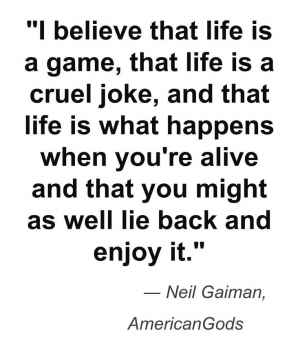

I disagree with this premise radically because I reject that people of a given “nation” are somehow bonded spiritually. To make this the premise turns intangible political entities (nations) into strictly bordered spiritual containers. Would there be an Odin in Belgium and Luxembourg? Or does all of Europe get one Odin who is different from the American Odin? I find it politically disagreeable to suggest that every country (or even continent) has different God-avatars.


Or is it each continent? Gaiman’s not quite clear about that. Here’s the unique twist in American Gods that caused my political antenna to start twitching-every God (like say Odin) has an “avatar” of him or herself in each country. Okay, I’ve heard the ratio-of-worshippers-to-power idea before so that’s not so original. The plot: there is a building power struggle between the old Gods (Norse, Native American, pagan, etc.) and the new Gods (Technology, Television, Money, etc.). The basic idea: the more worshippers a God has, the more powerful they are. But Gods help me, the more I read, the more I hated American Gods.įirst off, while the premise sounds interesting the more I thought about it, the less I liked it. For those who love this book-and I know it is many-please forgive the sarcasm to follow as I blaspheme against the beloved Gaiman. How on Gods’ Earth could a book about Gods walking on the Earth among mortals be so pedestrian? Somehow Gaiman managed to turn a potentially cool premise into something boring. Recommended.I find myself shocked at the awards this book has won and the praise heaped upon it. This is a quick read from a peerless storyteller with much to ponder after the reading. As one of the gods, yet not one of them, he ends up turning on them at the end as his offspring unite to devour the world. Loki’s character–mischievous yet helpful, ill-using yet ill-used–is the jewel of the book. The other characters spend a lot of time trying to spell things out for him since he’s not exactly quick on the uptake. Thor is strong and sturdy and a never-ending source of comic relief. He is the god that cut out his own eye so that he might become wise. He is the god that sacrificed himself to himself for the sake of knowledge. Odin’s iron and inflexible will comes out strongly in this story. The story may be of how Frey lost his sword…but Gaiman reminds us that Frey will wish he still had that sword when Ragnarok comes around. With the quality of a true bard, he unites the disparate tales in the common theme of impending and inevitable doom that Ragnarok spells. And what a retelling it is!Īlthough I was familiar with the myths from my childhood (remembering the same Roger Lancelyn Green book that Gaiman references in his intro), the way that Gaiman weaves them together is truly unique. These are the main players in Neil Gaiman’s retelling of the old Norse myths.


 0 kommentar(er)
0 kommentar(er)
